Category: News Articles
Final press release: The IcARUS Project Concludes with Innovative Urban Security Solutions That Will Continue to Shape European Cities
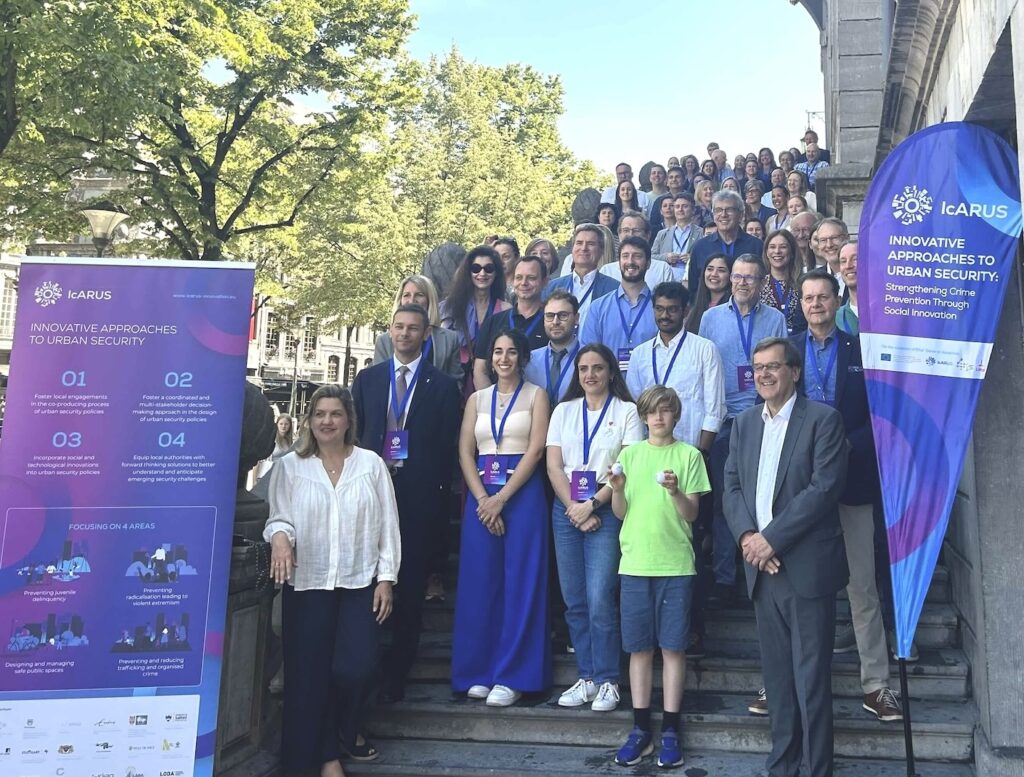
FOR IMMEDIATE RELEASE
The IcARUS Project Concludes with Innovative Urban Security Solutions That Will Continue to Shape European Cities
Date: 30/8/24
Contact: alexandros@loba.com; nourry@urbansecurity.org;
Website: https://www.icarus-innovation.eu/
The IcARUS project, a groundbreaking initiative in urban security funded by the Horizon 2020 program, has officially concluded after celebrating four years of impactful work. However, the project’s impact will endure, with its tools, strategies, and collaborative models continuing to benefit European cities as they address public security challenges.
The project, which brought together six cities—Lisbon, Nice, Rotterdam, Riga, Turin, and Stuttgart—along with leading research institutions, developed innovative solutions aimed at preventing juvenile delinquency, countering organized crime, safeguarding public spaces, and mitigating radicalization. IcARUS introduced a co-creation process where stakeholders and cities worked together to craft practical urban security solutions, enhancing engagement and ensuring sustainability.
Key Project Achievements:
- Practical Toolkits: IcARUS developed toolkits tailored for urban planners and security professionals, offering guidelines and methodologies to create safer cities.
- Innovative Workshops: Over 60 workshops were held, bringing together local stakeholders and security experts to co-create solutions that address real-world challenges.
- Pilot Programs: The project piloted its tools in real-world environments, testing and refining them to ensure practical applications and long-term relevance.
The tools developed through the IcARUS project will remain accessible to urban policymakers and practitioners. These include reports, manuals, and methodologies, all available on the IcARUS website.
“The project may have concluded, but the work will continue as cities adopt and adapt our tools. We’re thrilled to see the legacy of IcARUS contribute to safer, more resilient urban environments across Europe,” [said by EFUS coordintion team].
What’s Next?
While the IcARUS project formally ends, the consortium is exploring the potential for an IcARUS Innovation Studio, which would ensure continued development and adaptation of the project’s solutions to emerging urban security challenges. This initiative could help European cities remain resilient against evolving security risks.
About IcARUS
IcARUS (Innovative Approaches to Urban Security) is a Horizon 2020-funded project aimed at developing innovative solutions to enhance public security across European cities. Its multi-disciplinary approach combines research, co-creation, and stakeholder engagement to deliver tools that tackle modern urban security challenges.
For more information, visit https://www.icarus-innovation.eu/.
> Read The Changing Face of Urban Security: A Review of Accumulated Learning conducted by the University of Leeds
> The main results from the IcARUS research are here
> A brief presentation of each of six projects developed by the partner cities is available here
> Explore the IcARUS website for more articles, factsheets and research documents
> More information on Efus’ website / IcARUS section
MEDIA CONTACT:
Alexandros Koukovinis
LOBA
+351911147576
alexandros@loba.com


A lasting impact on Urban Security: Key Numbers from the IcARUS Project

The IcARUS project has made substantial impact in enhancing urban security across Europe, and the numbers tell a powerful story. Over the past four years, the project has developed six innovative tools specifically designed to address pressing security challenges in partner cities, which have been tested out in real-world environments, involving over 240 participants in 12 local workshops and training more than 120 practitioners!
The project’s reach and influence have been extensive, with key outputs including 11 factsheets, 6 policy briefs, and more than 7 scientific publications. These resources have provided valuable insights into the project’s work, helping to shape urban security strategies across the continent.
IcARUS has also made a significant contribution to public awareness and knowledge-sharing, producing 12 newsletters, 74 articles, and 26 videos and interviews. These efforts were complemented by the organization of 5 European conferences and participation in more than 70 European events, ensuring that the project’s findings were disseminated widely.
The success of IcARUS is also reflected in the training sessions delivered, with over 15 local practitioners trained in the Design Thinking methodology—a key component of the project’s approach. The innovative tools developed under IcARUS were designed to be human-centered and adaptable, ensuring they meet the diverse needs of different urban contexts.
As the project concludes, these numbers highlight the tangible impact IcARUS has had on urban security practices across Europe. The tools, strategies, and resources developed through this collaborative effort will continue to influence and improve urban security long into the future.
Find out more about the IcARUS legacy by exploring our website, and accessing all the results online!

A Journey Concluded, A Legacy Begun



As the IcARUS project reaches its conclusion, we reflect on a transformative four-year journey that has redefined urban security across Europe. From its inception, IcARUS was more than just a project; it was a collective mission uniting cities, universities, and organizations to address pressing urban security challenges.
The project’s foundation was built on innovation, collaboration, and a shared commitment to safer cities. Throughout this journey, IcARUS partners have worked tirelessly to co-create tools, strategies, and methodologies that address the complexities of modern urban security. From tackling organized crime to designing safer public spaces, preventing juvenile delinquency, and combating radicalization, IcARUS has delivered concrete outcomes that will resonate far beyond the project’s end.
A key aspect of this journey has been the active involvement of six partner cities—Lisbon, Nice, Riga, Rotterdam, Stuttgart, and Turin as well as the excecutive committee of cities. These cities have been both the testing grounds and beneficiaries of IcARUS’s innovative tools and approaches. Their experiences, challenges, and successes have shaped the development of practices that are not only effective but adaptable to different urban contexts across Europe.
The journey of IcARUS has also been marked by an unwavering focus on community engagement and inclusivity. The project’s success can be attributed to the strong partnerships formed between local authorities, law enforcement, civil society, and academia. These collaborations have ensured that the tools and strategies developed are grounded in real-world needs and can be sustained beyond the life of the project.
As we look back on the accomplishments of IcARUS, it is clear that this journey has laid the groundwork for a lasting legacy. The innovative approaches and solutions pioneered by IcARUS will continue to inform and inspire urban security practices across Europe. While the project itself may be concluding, its impact is just beginning, with the potential to shape safer, more resilient cities for years to come.

Training seminar “Education of professionals of the criminal justice system in restorative justice” in the framework of PROBATIONET Project
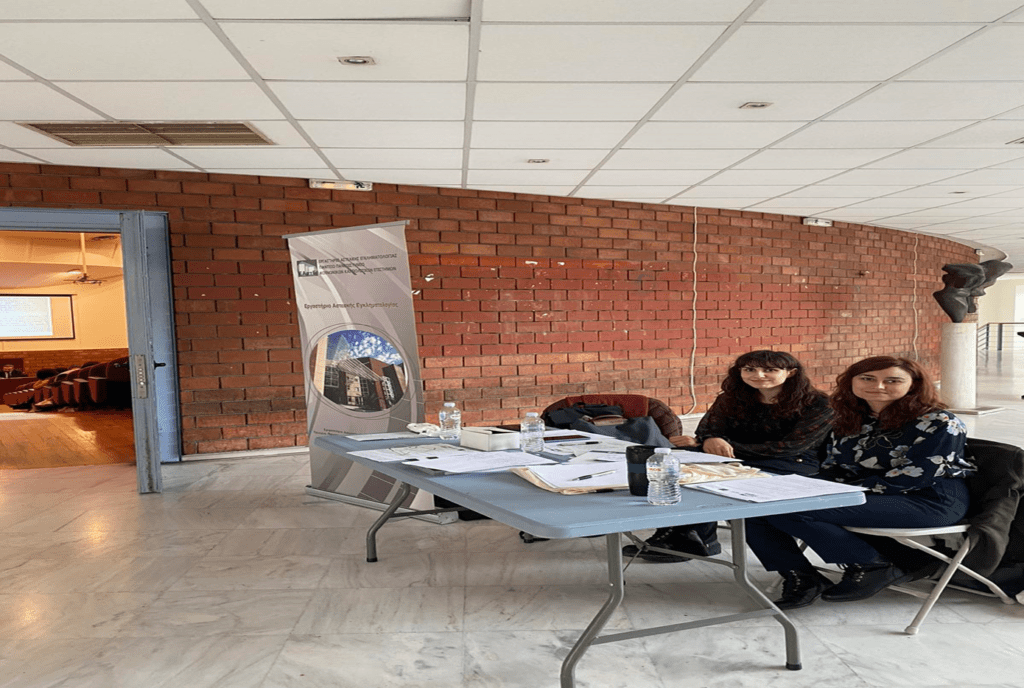
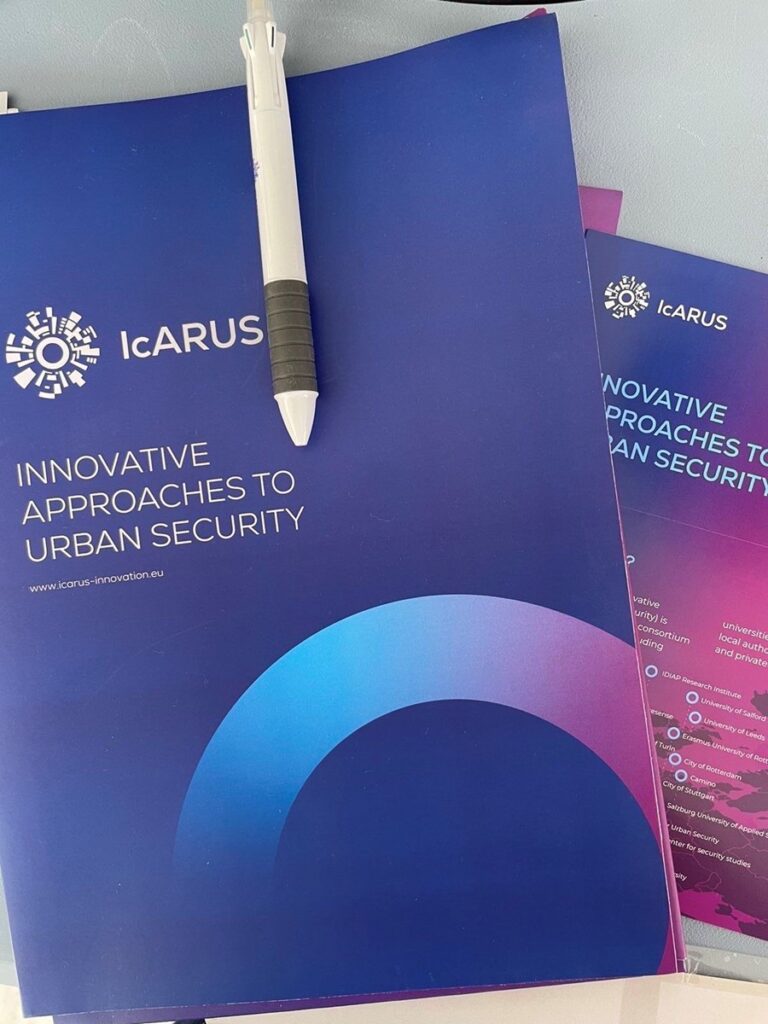
On 22 November 2023, the training seminar “Education of professionals of the criminal justice system in restorative justice” took place in the amphitheater “Sakis Karagiorgas II” of Panteion University. The seminar was organized by Panteion University of Social and Political Sciences via the Laboratory of Urban Criminology in the framework of the European Project “Probationet: Α flexible, multidisciplinary, and transnational VET model for the PROBATION services and practitioners” (Agreement Number: 2021-1-EL01-KA220-VET-000033290) under the scientific responsibility of Professor Christina Zarafonitou. During the seminar the Laboratory’s team distributed IcARUS material and leaflets to those who attended the seminar and informed them about the Project.
(20+) Στις… – Εργαστήριο Αστεακής Εγκληματολογίας Παντείου Πανεπιστημίου | Facebook

Democracy Researchers from FH Salzburg Support Solutions to Make European Cities Safer
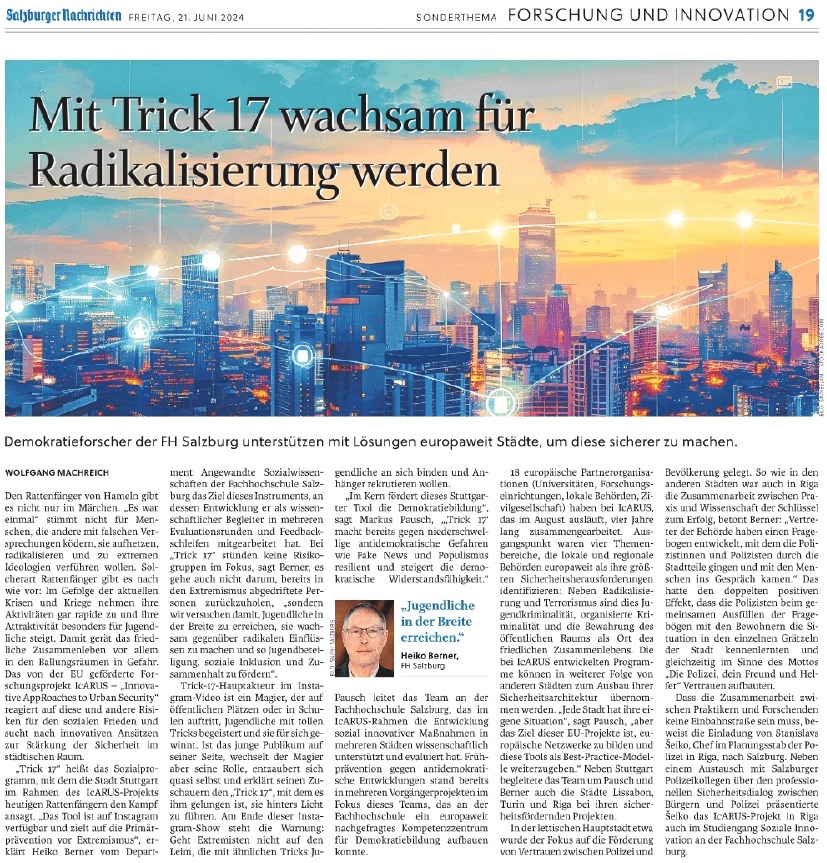
The Pied Piper of Hamelin is not just a fairy tale. “Once upon a time” doesn’t apply to people who lure others with false promises, radicalize them, and lead them to extreme ideologies. Such Pied Pipers still exist today: In the wake of current crises and wars, their activities are rapidly increasing, and their attractiveness to young people is especially high. This puts peaceful coexistence, especially in metropolitan areas, at risk. The EU-funded research project ICARUS – “Innovative AppRoaches to Urban Security” responds to these and other risks for social peace and seeks innovative approaches to strengthening safety in urban spaces.
“Trick 17” is the name of the social program that the city of Stuttgart uses as part of the ICARUS project to address these Pied Pipers, says Markus Pausch from FH Salzburg. The tool is available to all partners and aims primarily at preventing extremism, explains Heiko Berner from the Department of Applied Social Sciences at FH Salzburg. Its goal is to establish it as a scientific tool, in cooperation with evaluation rounds and feedback sessions. In “Trick 17,” the focus is not only on risk groups, Pausch adds, but also on reintegrating already radicalized individuals, “We try to widen the range, to achieve broad societal influence, and to promote social inclusion and democratic resilience.”
The Trick-17 main program video is shown in schools and public places where the magician, performing tricks, warns the audience not to fall for such Pied Pipers. “Trick 17” uses a sophisticated light show to convey this message. The warning: “Youth in general reach out.”
Pausch leads the team at FH Salzburg, which scientifically supports and evaluates the development of socially innovative measures within the ICARUS framework in several European cities. Early prevention against antidemocratic developments is the goal, emphasizing FH Salzburg’s expertise center for democracy building.
18 European partner organizations (universities, research institutions, local authorities, NGOs) have been working together in ICARUS for years. Different thematic focuses address the major security challenges in various regions: besides radicalization and terrorism, these include gang crime, organized crime, and the preservation of social cohesion. The programs developed under ICARUS can be adapted and applied elsewhere, including the involvement of local populations in the security architecture. “Each city has its unique situation,” says Pausch, “but the goal of these EU projects is to develop models that can be adapted universally.”
Stuttgart, along with other cities like Lisbon, Turin, and Riga, has successfully implemented this approach. For example, in Riga, the collaboration between police officers and the public was essential for success. Berner emphasizes that local authorities developed a questionnaire to engage with residents and understand their concerns directly. This process built trust in the police as “friends and helpers.”
The cooperation between practitioners and researchers is further evidenced by the invitation of Stanislavs Šeiko, head of the Riga police planning staff, to Salzburg. An exchange of experiences with the professional security service between citizens and police presented ICARUS projects in Riga was also presented during the “Social Innovation Studies” lecture series at FH Salzburg.
The aim of these initiatives is to build trust between the police and the community, making it easier for law enforcement to understand and address the specific issues within different neighborhoods. This dual approach not only helps in crime prevention but also strengthens community ties, fostering a sense of collective security and cooperation.
Key Points:
- Multinational Cooperation: The project involves 18 European partner organizations, including universities, research institutions, local authorities, and NGOs.
- Focus Areas: Addresses major security challenges such as radicalization, terrorism, gang crime, and organized crime, aiming to preserve social cohesion.
- Innovative Approaches: Programs like “Trick 17” use creative methods to engage and educate the public, particularly the youth, about the dangers of extremism and the importance of social inclusion.
- Local Adaptation: While the core principles of the programs are consistent, each city can adapt the strategies to fit its unique situation, ensuring relevance and effectiveness.
- Trust Building: Emphasizes the importance of trust between the police and the community, achieved through direct engagement and responsive actions.
The ICARUS project exemplifies how collaborative efforts and innovative strategies can enhance urban security and social cohesion across Europe. By involving a diverse range of stakeholders and focusing on both prevention and reintegration, these initiatives aim to create safer, more resilient communities.

Elaboration of training procedures for end users – a crucial step towards implementation and dissemination of the IcARUS toolkit
Camino has developed models and recommendations for the design and delivery of trainings for the end users of the IcARUS toolkit based on the evaluation of the training sessions which were held in Lisbon, Nice, Riga, Rotterdam, Turin and Stuttgart.
Background: The training sessions for the IcARUS toolkit
The “IcARUS – Innovative Approaches to Urban Security” project has developed a toolkit containing six tools to address key challenges in urban crime and violence across Europe. Although the manuals developed for the IcARUS toolkit contain precise information on how to implement the tools, the mere reception of this information will not be sufficient for the successful transfer and implementation of a tool. Methods should be tried out by those who are to use them later. For this purpose a training session for each tool was tailor-made and co-developed by the partners Efus, University of Salford, Idiap Research Institute, Camino and University of York in coordination with the IcARUS cities. The IcARUS training sessions marked the beginning of the demonstration phase. These sessions were designed for the end-users of each IcARUS tool, mostly consisting of the city’s civil servants, technicians and local police officers. The goal was to equip them with the necessary skills and knowledge to ensure a smooth start of the implementation phase, once the IcARUS project ends.
Learnings from the trainings and recommendations: the training procedures
The experiences from the trainings and the initial testing of the tools in the six IcARUS cities have been incorporated into the development of the training procedures, further enhancing the project’s impact and sustainability. The training procedures consist of general aspects for the trainings for the IcARUS Tool Box, the training models for each city and conclusions (to be included in the upcoming D4.5).
The training sessions took place as part of the participatory tool implementation in the six project cities. It is important to emphasise that the training does not replace the joint preparation of all stakeholders involved in the implementation. At the same time, the training should also be understood as part of the collaborative process of learning and unlearning from each other and thus always leave room for further ideas or criticism regarding the implementation of the tool.
For the training to be successful, it should be clarified beforehand that the invited participants know the tool development process and that the training participants are already familiar with their role in the implementation of the tool. The more extensive and complex the tool is, the more time is needed for training. However, time is often a barrier to participation. For the design of the training, this means that the trainers have to be mindful of the participants’ time.
To be successful, training courses must be designed to be as inclusive as possible. If the training, or parts of it, have to be translated, language barriers may arise, important details, especially regarding technical elements of the tools, may be lost. Ideally, the training should take place in the participants’ native language. However, it also plays a role whether the trainers are perceived as experts beyond their language skills. When tools are developed collaboratively, the focus is on local-specific problems; experts who are not familiar with this context often have less credibility. At the same time, very different skills are required for the training sessions: Facilitation, methodological knowledge, technical knowledge, gender and diversity skills. Ideally, a team of trainers is put together so that all these requirements are met in the best possible way. IcARUS pursues the approach of developing and implementing all tools from a gender-inclusive and discrimination-sensitive perspective in alignment with the European Commission’s priorities. This must also be implemented in the training, on the one hand by making the training itself as inclusive as possible by considering potential barriers, preventing stigmatising effects and by including a training unit to reflect on gender inclusivity from an intersectional perspective .

Efus launched its podcast channel on urban security: Join the conversation!
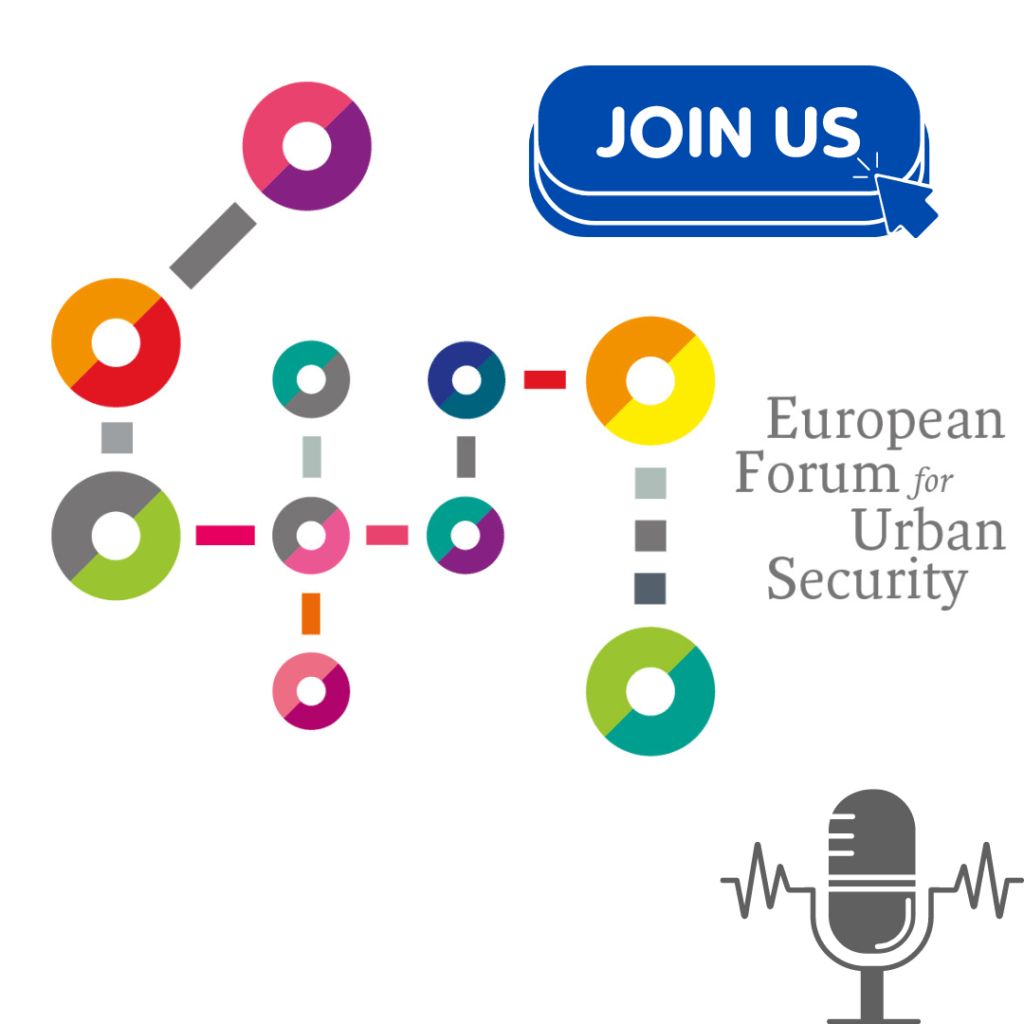
Paris, May 2024 – After a fruitful Security, Democracy and Cities conference in March in Brussels, the European Forum for Urban Security is launching a podcast channel to share its expertise and insights on urban security.
Together with representatives from some of our member cities and regions as well as experts and practitioners, we’re exploring in the first season (10 episodes) a broad range of urban security issues such as the security of large events, the local impact of organised crime, the prevention of radicalisation leading to violent extremism and more!
By giving voice to a wide variety of points of views and perspectives, our podcast series looks to facilitate knowledge sharing, inspire innovative approaches, and promote collaboration in creating safer and more inclusive urban environments.
Produced in the framework of the IcARUS project, the first episode will focus on 30 years of crime prevention and urban security starring Adam Crawford, Co-Director of the Vulnerability and Policing Futures Research Centre at the University of York and the University of Leeds (UK), and André Vervooren, former Director of the Safety Department of the City of Rotterdam (Netherlands). The episode is moderated by Efus’ Executive Director, Elizabeth Johnston.
They are available on all platforms including Spotify, Amazon music, YouTube and more. Join the conversation and subscribe to the only podcast (as far as we know!) dedicated to the future of urban security and resilience.

The IcARUS project concludes but it’s not the end

Launched in 2020 with the aim of helping local urban security actors to anticipate and better respond to problems by analysing and revamping their working methods and tools, Efus’ IcARUS project is concluding in August 2024. A look back on four years of intense work that combined research and innovative practices.
Paris, France, July 2024 – European local and regional authorities are confronted with multiple challenges in terms of urban security. Even though overall crime rates have dropped in Europe since the mid-1980s,* a significant proportion of the population still feels insecure, and new forms of crime and public order problems have emerged such as cybercrime or polarisation that can lead to violent extremism.
On the other hand, governments throughout Europe have been struggling with public debt and considerably reduced budgets allocated to local levels of governance while at the same time loading them with increasing responsibilities.
The European Forum for Urban Security (Efus) has seen first-hand how these trends have been and are affecting its 250 or so member cities.
Building on 30+ years of local practice
How can we build on our 30+ years of crime prevention practices and accumulated knowledge and help European local and regional authorities and their local partners better respond to urban security challenges, but also anticipate them? This was basically the question Efus sought to answer to when it designed the IcARUS project back in 2020.
After obtaining funding from the European Union’s Horizon 2020 research programme, Efus thus set out on a project that lasted four years and is concluding in August 2024 after a final conference held in Liège (Belgium) in late June.
An EU representative, Marta Cygan, Director for Innovation & Audit at the European Commission’s Directorate General for Migration and Home Affairs, stressed during the conference that “the IcARUS project is aligned closely with the urban security objectives of the Commission and the European Union, which are to ensure the protection of citizens and their fundamental rights.” What was particularly interesting in this project, she added, was that it associated six partner cities that can be considered as “small labs of life in a community where research on practice can be applied to test different solutions.”

A human-centred methodology focused on end-users
In order to properly research the knowledge accumulated over three decades of local crime prevention practices and exchanges among European cities and come up with innovative solutions, Efus set up a wide-ranging consortium that included six cities (Lisbon, Nice, Riga, Rotterdam Stuttgart and Turin), six universities and research institutes, and three civil society and private sector organisations.**
The IcARUS partners decided from the onset on a methodology they would adapt and test throughout the project: Design Thinking, which is widely used in the private sector to design new products and services and whose core principle is to approach issues from the perspective of users. It is the first time this methodology has been used in the field of crime prevention and security.
Four work areas
They also decided to focus their work on four areas that are of major concern to European local and regional authorities and crime prevention actors: the prevention of juvenile delinquency; the prevention of radicalisation leading to violent extremism; the protection and management of public spaces, and the prevention of and fight against trafficking and organised crime. All four are also priorities in the European Union’s Security Agenda.
“One of the main benefits of the project was to share collaborative resources and knowledge between academics, practitioners and stakeholders, but also citizens.” Adam Crawford, University of York and University of Leeds
Six cities, six prevention tools
One of the objectives was to anchor the project on real-life practice, hence the idea of associating six European cities that could bring their on-the-ground experience and knowledge. As the end-users of the project, they were invited to contribute by designing, together with the partner universities, a tailored prevention programme that would help them tackle an issue they deemed a priority.
This was a long process that took a lot of toing and froing between the cities and the other partners over the duration of the project, including two dozen workshops and training sessions. In the end, each set up a scheme, or adapted an existing one, which they presented to the 100 or so attendees at the final conference in Liège.
It would be too long here to detail each of these projects, which are all being implemented in real life, but here is a short description (a detailed presentation is available on the IcARUS website, see below):
- Lisbon focused on the prevention of juvenile delinquency with Jovem Design Lisboa (JDL), which seeks to involve young people in the safety of their community, improve their relations with local police, and strengthen their life skills.
- Nice decided to adapt the Ask for Angela (Demandez Angela) scheme whereby participating hospitality venues (bars, hotels, restaurants) and shops pledge to offer refuge and support to victims of harassment in the street, whatever their gender.
- Riga created a programme called Par drošu Rīgu! (For a safe Riga) that enables local police to base its tactics on police records and citizens’ feelings of (in)security.
- Rotterdam wanted to involve the users, mainly private businesses, of the vast industrial park located near the port to improve security and prevent infiltration from organised crime. It used the World Café methodology to set up the Spaanse Polder Café where growing numbers of locals meet regularly.
- Stuttgart chose to raise awareness among young people about the dangers of radicalisation, especially on social media, and to build their resilience. It created a travelling magic show that can be performed in different kinds of places (commercial malls, public squares, etc.). The audience is shown the tricks that radical/extremist movements use to woo new recruits.
- Turin chose (like Lisbon) to focus on the prevention of juvenile delinquency. It set up Sbocciamo Torino (Let Turin blossom), which is a network of practitioners and other prevention actors. Together, they work to design interventions in Turin’s neighbourhoods, aided by a visual digital dashboard presenting relevant data.
What impact?
Speaking at the conference, Adam Crawford, Professor in Criminology & Criminal Justice at the University of York and the University of Leeds (UK) and one of the project’s partners, drew some takeaways:
“We’ve been on a journey for four years that was very productive. I would point out three main benefits and three main challenges:
– The first benefit is about the collaborative resources and knowledge between academics, practitioners, stakeholders, but also citizens.
– The second one is about experimentation: doing something new, pushing the boundaries.
– The third one is about organisational learning, when organisations are often not very good at learning.
– The first challenge is re-inventing the wheel as opposed to doing the same as everybody else.
– The second one concerns time horizons. Practitioners are about the now, whereas researchers know that learning and innovation take time. We need both attending to the here and now and foresight.
– The third one is that organisations tend to be risk averse, in particular in the law enforcement and security field where doing things wrong can have serious consequences. However, we must escape from the enclosure of ‘it has to succeed.’”
Now what?
The IcARUS project is now concluded, but it’s far from having ended. Local authorities, practitioners and researchers can benefit from its wealth of findings and insights (see below for links to some of the project’s resources). Now, Efus, together with the IcARUS partners, intends to further the work carried out over four years to tailor its offer of support to its member local and regional authorities across Europe.
As such, Efus will build on the project’s results and evaluation to fine-tune its services to European local and regional authorities, which range from local safety audits and state-of-the-art reviews to the benchmarking of practices, peer-to-peer learning, customised strategic guidance, pilot testing, evaluation and knowledge management (notably through training), and exploring networking opportunities with the private sector, civil society and the research community.
* The research conducted in the IcARUS project shows that prevention played a significant role in the decrease in aggregate crime rates in relation to traditional property and public crimes. However, it also shows that despite its ‘success’, crime prevention remains under-resourced and poorly implemented.
** The IcARUS consortium : Project Coordinator: Efus – Local authorities: city of Lisbon (PT), city of Nice (FR), city of Riga (LV), city of Rotterdam (NL), city of Stuttgart (DE), and city of Turin (IT) – Universities and research partners: Salzburg University of Applied Sciences (AT); Erasmus University of Rotterdam (NL); Panteion University (GR); University of Salford (UK); University of Leeds (UK); IDIAP Research Institute (CH); KEMEA (GR) – Civil society and private sector organisations: Plus Ethics (ES), Makesense (FR), Camino (DE) – Dissemination and communication: Loba (PT)
> Read The Changing Face of Urban Security: A Review of Accumulated Learning conducted by the University of Leeds
> The main results from the IcARUS research are here
> A brief presentation of each of six projects developed by the partner cities is available here
> Explore the IcARUS website for more articles, factsheets and research documents
> More information on Efus’ website / IcARUS section

FINAL COUNTDOWN FOR THE IcARUS PROJECT
The 8THcoordination meeting, followed by the final conference: “Innovative Approaches to Urban Security: Strengthening Crime Prevention Through Social Innovation” were successfully conducted on the 25th and 26th June 2024 in Liège (Belgium). Simultaneously, the Efus’ General Assembly also took place on the same date and place. The events were kindly hosted at the premises of Liege City Hall, also known as La Violette, an impressive architectural jewel, built in 1714 and listed as an ’exceptional heritage’ of Wallonia since 2002.
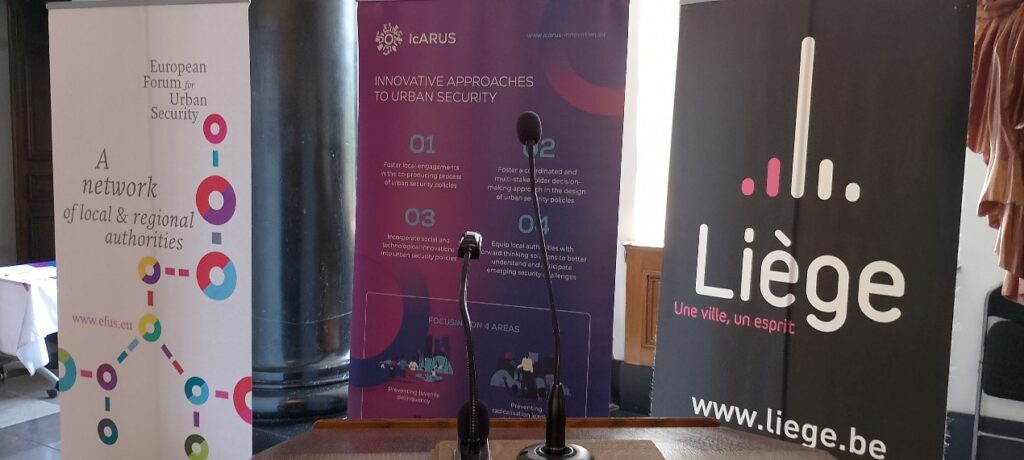
During the coordination meeting, the main outputs of the project were presented to all partners, but also concrete ideas on the sustainability of its developments and results, such as the Innovation Studio, were highlighted. This studio would work as a lab, divided in 6 areas of action: define and understand the issues, draw inspiration, co-produce local security strategy, testing a pilot and implementing a solution, evaluation-knowledge management, sustainability-transferability.
The finalpending activities of the project are expected to be concluded before its finalization, on the 31st August 2024.
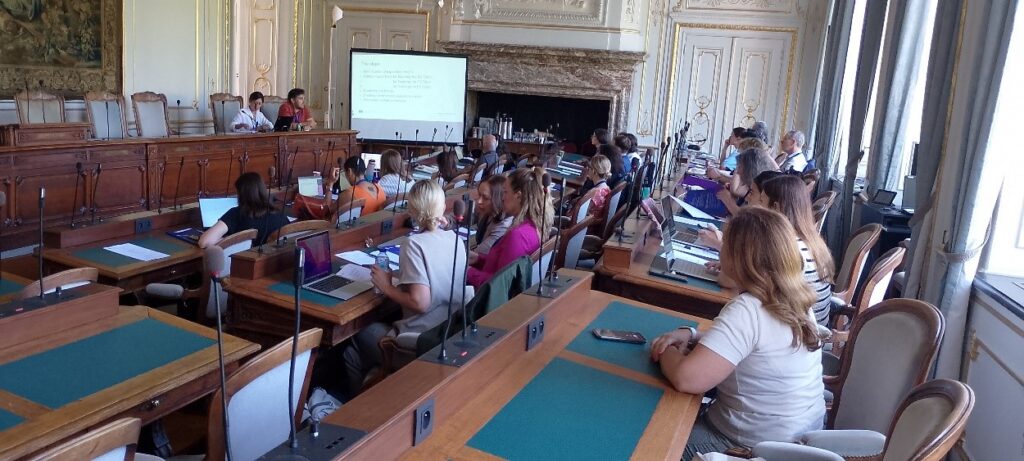
As for the subsequent Conference, six panels composed the agenda, gathering representatives from different Cities’ Councils as well as experts from several EU countries and wide fields of expertise, from the practitioners’ level to the researchers, academics and other affiliations. Having as a starting point of the discussions the tools created by the 6 cities within the framework of the IcARUS project, very important presentations and interactions took place, focusing on the following topic areas: Innovations inPolicing Tactics and Anti-Harassment Initiatives based on information provided by citizens, Unveiling the Power of Social Innovation in Urban Security, Preventing Radicalization Leading to Violent Extremism: Arts and Culture at the helm of Innovation, Building Resilient Communities: Fighting Organized Crime and Fostering Social Cohesion, Community-Led Solutions: Fostering Young People’s Engagement and Collaboration in Preventing Juvenile Delinquency, Evaluating Urban Security Initiatives: Exploring Challenges and Opportunities.
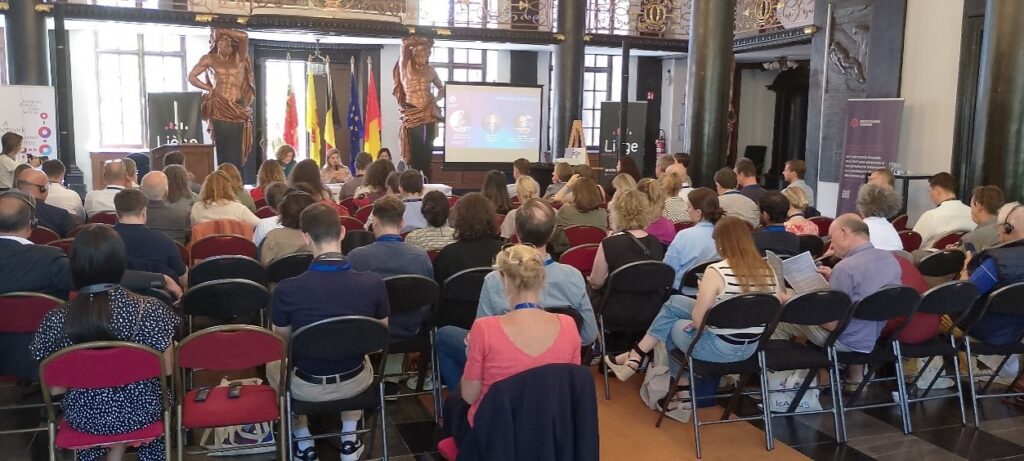
Among the many interesting opinions expressed, the phrase “choose your battles”, on the kinds of criminal activities that stakeholders could fight was a shocking yet realistic suggestion, since not all forms of crime could be simultaneously addressed.
Moreover, the important need for consideration of the “balloon effect” on the possibility of transfer of criminal activities to other areas has been a not to be omitted point for every decision maker. As many recommendations for the cities to respond and prevent crime, were put on the table, these could be summarized on the need for monitoring, scheduling the objectives to achieve and the design of a broader-scale plan on the intervention.
What an exciting, deep learning and innovative journey it has been!
The future of IcARUS is about to begin!

Participatory Artificial Intelligence and Local Governments
Artificial intelligence (AI) is transforming many industries, and public administration is no exception. Last Month (May 2024), Prof. Daniel Gatica-Perez took part in the 12th edition of eGovernment Symposium Romand on the theme of public administrations and Artificial Intelligence held at the Swiss Digital Center in Sierre in the canton of Valais in Switzerland. It brought together representatives from business, government, academia, and politics to discuss the opportunities and limitations of AI in administration. The symposium provided a platform for collaboration and knowledge exchange between various stakeholders.
Prof. Daniel Gatica-Perez from Idiap showcased the collaborative tools from [Idiap’s] (https://www.idiap.ch/en) [Centre for Participatory AI] (https://www.idiap.ch/en/scientific-research/center-for-participatory-ai). In particular, he talked about Participatory and equitable AI and the human values involved in designing, developing and deploying socio-technical systems. He presented the [IcARUS project] (https://www.icarus-innovation.eu) as a case study. Talking about the IcARUS project, he mentioned gathering of 17 partners and drawing together the best evidence from urban security research and practice from the last 30 years to implement an evidence-based, integrated, multi-stakeholder approach to urban security problems.
Discussing the questions of “What human forces should be amplified?” and “How to support the public in the loop?” he presented the “EIPG: Evidence-Informed Participatory Governance” model developed in the IcARUS project and its implementation through the tool created for the cities of Turin and Riga, namely Sbocciamo Torino and Par drošu Rīgu!
Lastly, he discussed the case study of “Generative AI and local governments” providing examples of existing tools in cities, Idiap’s Centre for Participatory AI, and the EU AI Act. He concluded the talk with a presentation of the 12 defining competencies of Generative AI literacy which was also developed in the IcARUS project.

subscribe to be the first to receive icarus news!
Know what we've been up to and the latest on the European urban security frame.









